On January 9, T4A hosted a video call for its members. Here are the slides from that call.
Tag: THUD
Member Policy Memo: Final FY2020 THUD Appropriations Bill
On December 16, 2019 House and Senate negotiators released the text of an agreement, also known as
a “conference report” on FY20 appropriations. The agreement is comprised of two bills, with the THUD
appropriations included in H.R. 1865, the Domestic Priorities and International Assistance
Appropriations Minibus. The House and Senate approved the bill, and the President signed it into law before the current continuing resolution (CR) with temporary funding levels for federal agencies expired on December 20. Here is the analysis from our policy team provided exclusively to members.
Try as Trump might, transit grants are here to stay
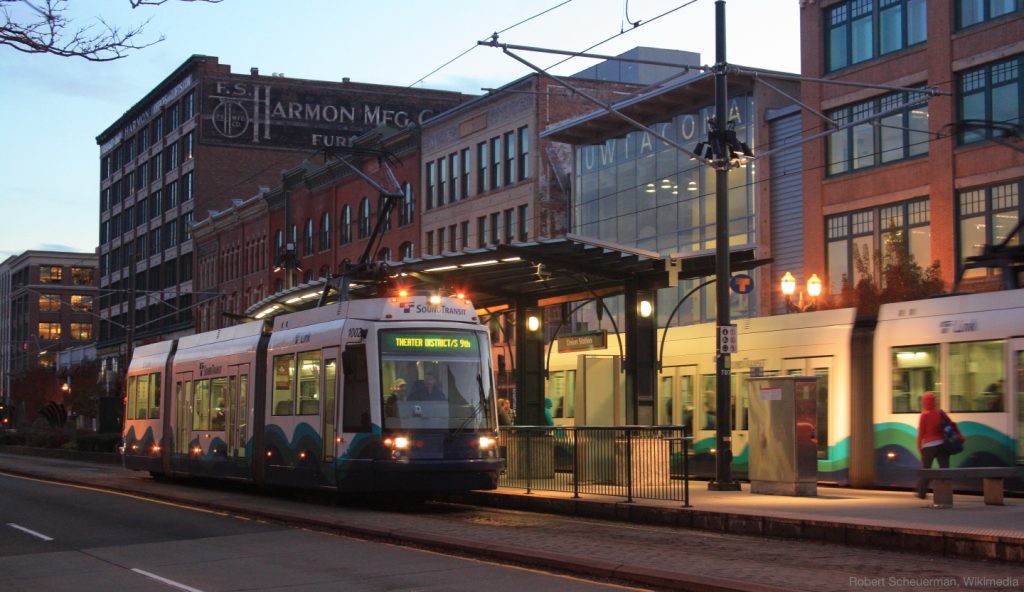
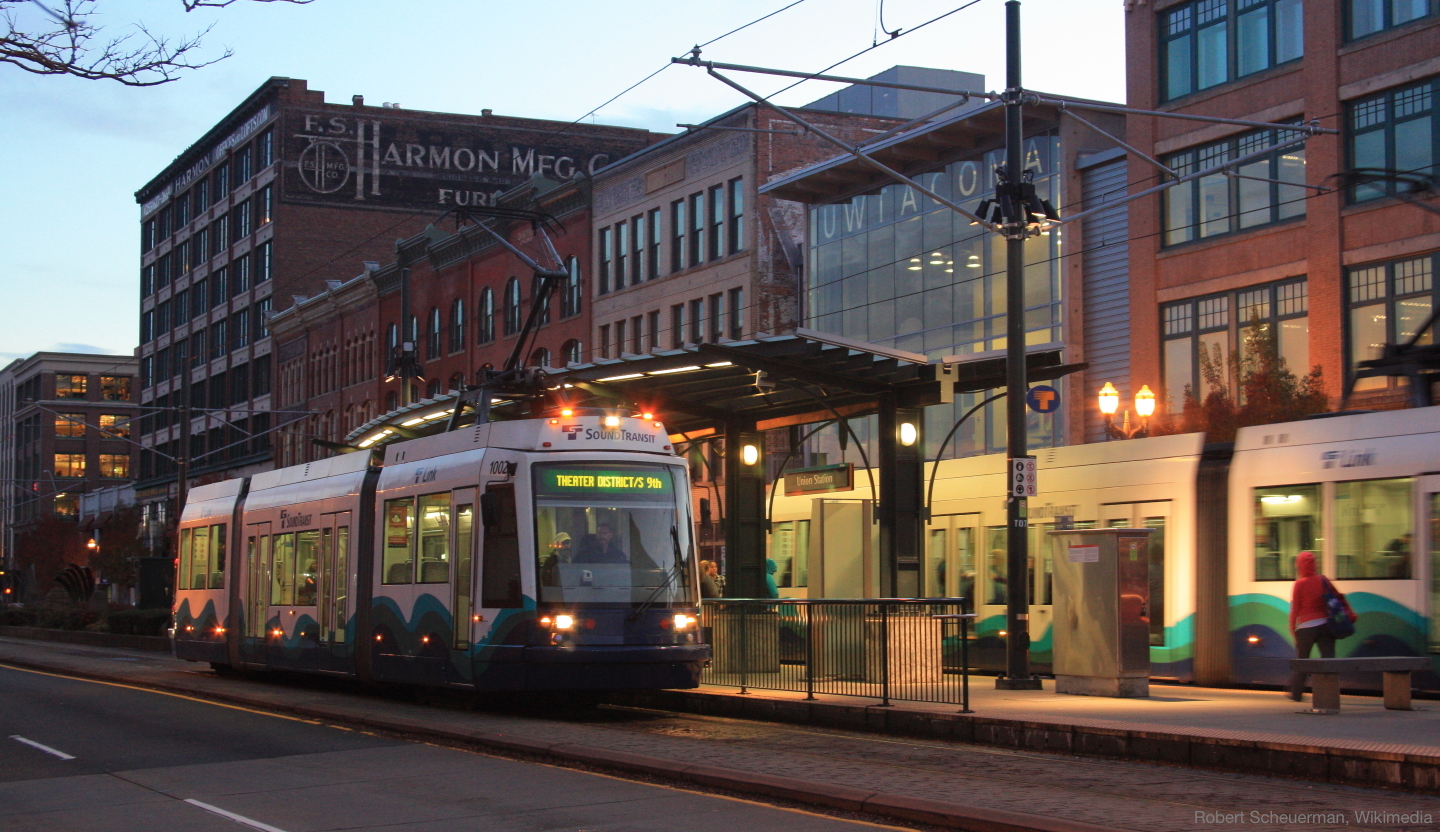
The Trump administration has repeatedly tried to eliminate a critical transit grant program and Congress has repeatedly parried those attempts. The new transportation funding bill from the U.S. House is only the latest evidence that those transit grants are here to stay.
The House of Representatives’ Appropriations Committee recently released a funding bill that covers transportation funding—everything from passenger rail, to highways, to various grant programs like BUILD. One program in particular—the Capital Investment Grant (CIG) program that funds new transit and system expansions—has been a target in this administration’s crusade against transit, as we catalogue in Stuck in the Station.
But despite the administration’s repeated requests to eliminate or cut funding for this program, the new Democratic majority preserved funding for this program—just as the Republicans did when they controlled the House. While there are some proposed changes to the program that help illuminate some of what’s happening behind the scenes, here’s the bottom line:
The administration is still very actively trying to kill the program, Congress is doing as much as they can to ensure the program is executed as intended, and every indication is that this program is here to stay.
Let’s talk funding
All the talk in Washington is about money, so let’s just get this out of the way. Transit grants saw a small ($251 million) decrease over last year’s funding, but that’s only because last year’s was $251 million higher than authorized. So nothing new here.
By our calculations, there are more than enough transit projects making their way through the pipeline that are eager for a slice of this funding. That said, the administration is trying to paint a different picture. By failing to sign new grant agreements, adding additional and unclear requirements, releasing less information publicly, and requesting $0 (or massive cuts) for the program, the Trump administration is trying to undermine this transit funding and discourage local transit agencies from even applying. But Congress has stepped up their oversight of the program to make sure good projects continue to apply and get the funding they deserve.
Congress beefs up oversight
In an attempt to force the U.S. Department of Transportation (USDOT) to actually award grants, sign grant agreements, and fund new transit projects, Congress added unprecedented language last year’s funding bill requiring 80 percent of funding be distributed to projects by the end of 2019. Stuck in the Station tracks USDOT’s progress toward this requirement.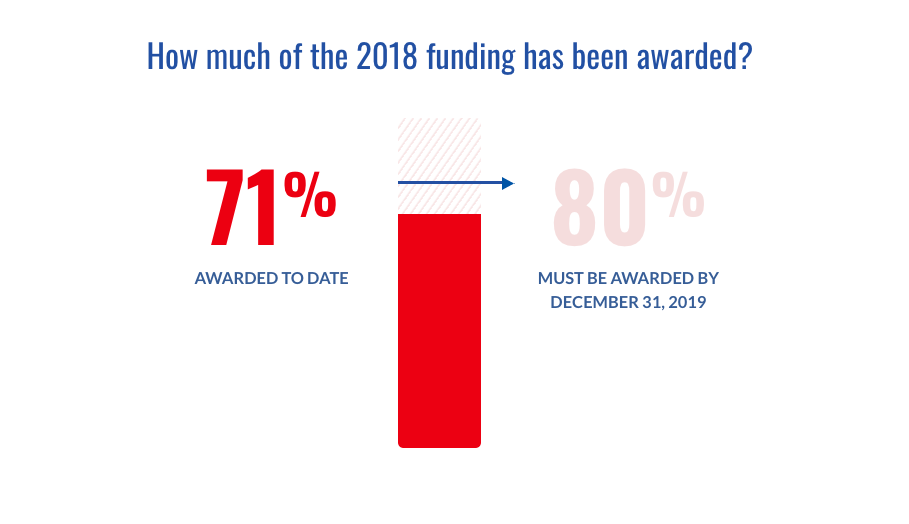
In response, to avoid signing new grant agreements, USDOT has taken the unusual step of doubling awards to projects they’re already obligated to fund to try and hit that mark. And they’ve misled the public about their intentions to sign new grant agreements with some serious verbal gymnastics.
This year, the House has upped the ante. The same 80 percent requirement exists (USDOT will have to distribute 80 percent of this funding by the end of 2020), but any unspent funds would now be automatically awarded to projects in the pipeline, even if the administration has refused to sign a grant agreement. USDOT either needs to do its job and advance these projects or Congress will do it for them.
Federal transit grants aren’t going away
As communities attempt to manage inexorable growth and change, transit investment is critical. Public transportation is and integral part of retaining a talented workforce, attracting businesses and jobs (and getting workers to those jobs), providing affordable transportation and reducing inequities in our communities, reducing greenhouse gas emissions and other dangerous pollutants, improving safety, and reducing congestion.
Undermining federal transit funding doesn’t change those facts; communities are and will continue to invest in transit and the federal government should be a partner in those efforts, not an obstacle. But regardless of USDOT’s actions, there is no indication that grants for new and expanded transit are going anywhere anytime soon. This House appropriations bill is just the latest example.
Policy Memo: FY20 THUD House Bill
On May 22, the House Appropriations Committee subcommittee on Transportation, Housing and Urban Development (THUD) released its fiscal year 2020 (FY20) appropriations bill. This member-exclusive memo describes the bill.
Policy Memo: THUD Conference Agreement
This information was supplied to members via email on January 22, 2019. We are posting it here today so members can use this option to find it.
On January 17, the House of Representatives released the full conference agreement between the House and Senate for the remaining six appropriations bills that have not been signed into law. The Transportation, Housing and Urban Development (THUD) FY19 appropriations bill conference report is included in this package. If Congress passes a full year FY19 appropriations bill this year, it is extremely likely that these are the final THUD funding levels and provisions.
T4A’s policy team has provided this memo exclusively for members. In addition, here is a brief power point slide deck that puts funding levels for various programs in context.
116th Congress Begins
This information was supplied to members via email on January 4, 2019. We are posting it here today so members can use this option to find it.
There are a lot of issues in play as the 116th Congress starts this week: a continuing government shutdown, new leadership in the House of Representatives, a new FY19 Appropriations bill from the Democratic-led House, committee leadership decisions, and discussions on an infrastructure package, reauthorization of the FAST Act, and the beginnings of FY20 appropriations discussions looming in the next few months. To keep you informed and prepare you for what almost certainly will be an interesting year, our policy team has provided what you need to know in this memo.
For those of you who like charts, and to help place the Democratic House FY19 Appropriations bill funding levels in context, check out this slide deck.
Also, not on the memo linked above because it just happened a a few hours ago ago: Senate Republicans finalized their committee memberships. As a reminder, committee assignments for Senate Democrats are here.
Summary of House Fiscal Year 2019 Transportation, Housing and Urban Development Appropriations Bill
On May 16 the House Appropriations Subcommittee on Transportation and Housing (THUD) passed, by voice vote, its funding bill for fiscal year 2019 (FY19). Under this bill, the U.S. Department of Transportation is funded at $71.8 billion for FY19. This is $1.5 billion above the FY2018 enacted level. The full House appropriations committee is expected to markup the bill on May 23.
The following is a brief summary of key parts of the bill.
Capital Investment Grants (CIG)
The bill provides $ 2.614 billion for CIG, a 0.5 percent increase over the FY18 enacted level. The bill requires the U.S. Department of Transportation (USDOT) to advance projects through the pipeline and to obligate $2.222 billion by the end of 2020. In addition, the bill directs the Trump Administration to reissue the FY19 Report to Congress with allocations for projects. The bill allocates CIG funding as follows:
- Existing New Starts full-funding grant agreements (FFGA): $836 million
- Additional New Starts projects (e.g. in project engineering, project development phases): $500 million
- Core Capacity projects with FFGAs: $200 million
- Additional Core Capacity projects: $550 million
- Small Starts projects: $502 million
BUILD
The bill directs $750 million to Better Utilizing Investments to Leverage Development (BUILD) grants (formerly known as the Transportation Investment Generating Economic Recovery (TIGER) grant program). This allocation represents a 50 percent reduction in funding compared with the FY18 enacted funding level of $1.5 billion; however, it is a 50 percent increase in funding for the program when compared to historic funding trends for TIGER that have generally been appropriated for $500 million annually.
The funding is allocated as follows:
- Projects in rural areas (below 200,000 in population): $250 million
- Projects in urbanized areas (above 200,000 in population): $250 million
- Projects at seaports or intermodal facilities: $250 million
Historically, funding for the TIGER/BUILD program has not been apportioned by geography or mode by statute, though there has been a mandatory set aside for rural projects and a requirement for geographic diversity. Historically grants have been distributed across all modes and a broad geography of the county.
The bill requires USDOT to conduct a new competition to select projects to fund. USDOT must issue a NOFO within 60 days of enactment of the appropriation, set a deadline for applications within 90 days of enactment, and award grants within 270 days of enactment.
The bill prohibits USDOT from using federal share of project funding as a selection criteria.
The bill also sets the minimum BUILD award at $5 million and the maximum at $25 million.
Highway programs
The bill obligates $45 billion from the Highway Trust Fund for Federal-Aid Highway programs, as authorized by the FAST Act. The bill appropriates an additional $4.25 billion from the general fund to highway programs. This additional funding is allocated to:
- Construction of highways, bridges, and tunnels: $3.812 billion
- Highway safety improvement projects: $250 million
- Puerto Rico Highway Program: $31 million
- Territorial Highway Program: $8 million
- Tribal Transportation Program: $50 million
- Nationally Significant Federal Lands and Tribal Projects Program: $100 million
These amounts are apportioned to the states, tribes, and territories through the same formulas as funds from the Highway Trust Fund.
The supplemental General Fund allotment for highway safety improvement projects is exempted from the high-risk rural road safety rule that requires states to direct additional funds to rural highway safety projects if the fatality rate on rural highways increases.
Transit grants
The bill appropriates $9.9 billion from the Mass Transit Account of the Highway Trust Fund to transit formula programs, as authorized by the FAST Act. The bill provides an additional $800 million from the general fund for transit capital grants, allocated to:
- Bus and Bus Facilities: $350 million (of which $50 million is for No and Low Emission Buses)
- State of Good Repair: $200 million
- Rural formula grants (Section 5311): $50 million
- Urbanized area formula grants (Section 5307): $150 million
- Growing States and High Density States formula grants (section 5340): $50 million
Rail
Rail infrastructure and safety programs are funded at $3.2 billion, $63 million over the FY18 enacted level. The bill provides a total of $1.9 billion for Amtrak, of which $650 million is for the Northeast Corridor and $1.3 billion is to support the national network. The bill also provides $221 million to fund FRA’s safety, operations, research and development activities. The Consolidated Rail Infrastructure and Safety Improvement (CRISI) Grants Program is funded at $300 million, of which $150 million is for Positive Train Control. The Federal-State Partnership for State of Good Repair Grants program is funded at $500 million and the Restoration and Enhancement Grants program is not funded.
Looking ahead: Senate
The Senate THUD subcommittee is expected to consider its own FY19 funding bill the week of June 4.
For questions or more information, please contact Scott Goldstein at scott.goldstein@t4america.org or 202-971-3911.
Stories You May Have Missed – Week of October 13th
Stories You May Have Missed
As a valued member, Transportation for America is dedicated to providing you pertinent information. This includes news articles to inform your work. Check out a list of stories you may have missed last week.
- “Rural America looks to Trump to help with crumbling infrastructure.” (Washington Examiner)
- Democrats gathered last week to discuss ideas for President Trump’s promised infrastructure package and criticized the White House for the continued lack of a concrete proposal. (The Hill)
- The Senate Environmental and Public Works (EPW) Committee will vote on Paul Trombino’s nomination to be the administrator of the Federal Highways Administration (FHWA) on Wednesday. The nomination is expected to pass easily. (Senate EPW Committee)
- The Chairman of the Senate Transportation and Housing and Urban Development (THUD) Appropriations Subcommittee, Susan Collins (Republican-Maine), announced she will stay in the Senate rather than run for Governor of Maine. (Politico)
- The Verge reports that “self-driving cars are coming, and US cities are totally unprepared for the radical changes that will accompany them.” (The Verge)
- Brookings Institute Commentary: President Trump is undermining the chances of an infrastructure plan passing. (Real Clear Politics)
- Streetsblog covers a protest over a bike lane in Minneapolis that rose to a whole new level. (Streetsblog)
Statement from Transportation for America on House Passage of THUD Appropriations
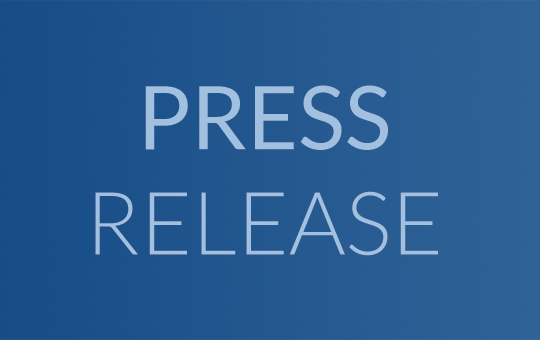
On Thursday, September 14, the House of Representatives passed H.R. 3354, the “Make America Secure and Prosperous Appropriations Act, 2018”, which contains the fiscal year 2018 Transportation, Housing and Urban Development (THUD) appropriations. Beth Osborne, interim T4America director, issued the following response:
“We are disappointed and concerned that the House decided to move ahead with a bill that cuts federal appropriations for vital transportation programs, including the TIGER and transit Capital Investment Grant (CIG) Programs. Local governments and voters are investing their own dollars on innovative transportation, housing, and neighborhood revitalization projects but they need help from these vital federal programs to make these things happen. This spending bill pulls the rug out from under those communities.
“The House-passed THUD spending bill zeroes out funding for TIGER, a crucial program that gives local governments direct access to federal dollars for innovative projects. TIGER projects are overwhelmingly multimodal and multijurisdictional projects — like rail connections to ports, complete streets, passenger rail, and freight improvements — that are often challenging to fund through the underlying formula programs. In 2016, U.S. DOT received 585 applications totaling over $9.3 billion, reflecting an overwhelming demand across the country for the TIGER program. Through the first seven rounds of grant awards, each TIGER dollar brought in 3.5 non-federal dollars. Given the $500 million appropriated last year by Congress, that’s over $1.5 billion in other critical infrastructure spending that would likely be lost under this bill.
“This bill also appropriates no money for new transit investments through the Small Starts and New Starts programs. These programs provide federal matching funds for communities and regions that are taking the initiative and committing hefty sums of their own local dollars to build or expand transit systems. Without additional federal funding for transit construction, its likely that few, if any, new transit projects will be built.
“This appropriations bill ignores why communities need federal community development and transportation programs. It’s not just that they need money or innovative tools — which, for the record, they do. They also need a reliable partner who can support their work, not austerity measures that punish them for taking action. If the federal government quits being that reliable partner — which this appropriations bill absolutely implies — it will cause lasting damage to American communities and break the President and Congress’s promise to rebuild our nation’s infrastructure. These programs invest in communities across the country, improving mobility, security, and economic opportunity. Now is not the time to slash these investments.
“We urge the Senate to reject the disinvestment this bill represents and instead pass a bill that reinvests and rebuilds America for the future.”
Stories You May Have Missed – Week of September 15th
Stories You May Have Missed
As a valued member, Transportation for America is dedicated to providing you pertinent information. This includes news articles to inform your work. Check out a list of stories you may have missed last week.
- “An Infrastructure Deal Should Be Easy, But Isn’t.” (Bloomberg)
- The House of Representatives passed the package of eight appropriations bill, including the Transportation and Housing and Urban Development (THUD) appropriations bill, that they began consideration of last week. (The Hill)
- The Chair of the Senate Environmental and Public Works Committee, John Barrasso, published an op-ed about his plans on infrastructure. (Washington Examiner)
- Slate covers U.S. DOT’s recently released autonomous vehicle regulation and explains why relying on voluntary safety efforts could be harmful to our communities. (Slate)
- Wisconsin’s state budget bans cities and towns from using eminent domain to expand or build new sidewalks, bicycle lanes and trails. No such provision is applied to using eminent domain for expanding highways or roads. (Wisconsin State Journal)
- Politico Europe covers how Amsterdam is leading in transportation innovation and how their embracement of the bicycle is a big reason why. (Politico Europe)
- Op-Ed Essay: “The end of walking.” (Aeon)
Recent Congressional Activity Summary-Week of September 8th
As a valued member, Transportation for America is dedicated to providing you the latest information and developments around federal policy. This dedication includes in-depth summaries of what is going on in Congress and the U.S. Department of Transportation (U.S. DOT). Check out what you may have missed in our member webinar last week.
House of Representatives Appropriations
Before this Friday, current appropriations for the Federal Government were scheduled to expire September 30th, which is the end of the 2017 fiscal year.
During this past week, the House of Representatives (House) considered H.R. 3354, a mini-omnibus package consisting of 8 appropriations bills, including the Transportation, Housing and Urban Development (THUD) appropriations bill. The official title of the omnibus package is the “Make America Secure and Prosperous Appropriations Act, 2018.”
The four appropriations bills the House considered on Wednesday were 1) Agriculture/Rural Development 2) THUD, 3) Homeland Security and 4) State/Foreign Operations. On Thursday and Friday, the House began consideration of the four remaining appropriations bills which are 5) Interior/Environment, 6) Commerce, Justice, Science, 7) Financial Services and 8) Labor/Health and Human Services.
While a final House vote on the House appropriations package was initially scheduled for Friday, the impending arrival of Hurricane Irma caused the House to delay final consideration and passage of the “Make America Secure and Prosperous Appropriations Act, 2018” until this upcoming week. This decision was made in order to give the representatives from Florida, and other states likely to be impacted by Irma, time to get home to their constituents.
After the passage of these 8 bills, the House will have passed all 12 of their appropriations bills that fund the activities of the Federal Government. The House passed their first four appropriations bills before August recess; those bills fund the Defense Department, the Department of Veteran Affairs, Legislative Operations, and Energy and Water.
The House Rules Committee, which is the body of the House that determines the rules for debate on a given bill, advanced for floor consideration roughly 40 amendments out of the 90 amendments that were submitted to the Rules Committee for consideration on the House THUD bill. You can access T4America’s tracker of the amendments T4America was watching closely here.
There were two amendments that were made in order that T4America was concerned about. Those two amendments were the Ted Budd amendment (Republican, North Carolina’s 13th Congressional District) and the Mo Brooks amendment (Republican, Alabama’s 5th Congressional District). Representative Budd’s amendment would have: 1) cut $475 million from the Federal-State Partnership for State of Good Repair grants, which was funding intended in part for the Amtrak gateway project, 2) eliminated the possibility of restoring funding for the TIGER program by applying the savings to deficit reduction and 3) Shifted $400 million in funding from intercity city passenger rail grants to the New Starts Program. Representative Brooks’ amendment would have eliminated federal funding for Amtrak’s national network operations.
Thankfully, the Budd amendment failed to pass by a vote of 159-260 and the Brooks amendment failed to pass by a vote of 128-293.
Debt Ceiling and Continuing Resolution Agreement
On Wednesday, during a meeting with Congressional leaders from both parties, President Trump reached an agreement with Senate Minority Leader Chuck Schumer and House Minority leader Nancy Pelosi to extend the debt ceiling and government funding by approximately three months until December 8th, as part of a legislative package that provides federal funding for Hurricane Harvey relief and extends the federal flood insurance program temporarily. The Senate passed this legislative package on Thursday by a vote of 80-17 and the House of Representatives passed it on Friday by a vote of 316-90, sending the legislation to President Trump, which he signed into law on Friday.
Surprisingly, a majority of Republicans in both Houses voted to pass the package even though Speaker Paul Ryan and Majority Leader Mitch McConnell indicated they strongly disagreed with the deal President Trump struck with Democrats and the influential House Republican Study Committee and other outside conservative groups opposed the deal as well.
Due to the passage of the legislative package, the debt ceiling and appropriations for the Federal government will now end on December 8th. We expect this deadline to lead to intense, high-stakes negotiations to reach a full year appropriations agreement and a long-term extension of the debt ceiling. Additionally, because of the importance of these negotiations, we expect immense pressure to include other items that are unrelated to appropriations but important to one party or the other. For example, early indications are that Democrats will insist on no discretionary funding spending cuts, the inclusion of the Deferred Action for Childhood Arrivals (DACA) program and health care insurer payments to stabilize ACA as the price for their votes.
Senate Appropriations
The Senate Appropriations Committee is still in the process of writing and approving their Appropriations bills. So far, the process in the Senate has been bipartisan and they have rejected cuts to non-defense discretionary spending that the House has adopted in their appropriations bills. Due to the spending cuts, the process in the House has been more partisan than the Senate.
There has been no indication from Senate Majority Leader Mitch McConnell that there will be Senate floor time to consider individual appropriations bill. At this point, T4America expects that all 12 of the appropriations bills will be rolled up into a giant omnibus by the new deadline of December 8th after negotiations over top line funding levels are completed with the House and between the two parties.
House and Senate Automated Vehicle Legislation
The House of Representatives on Wednesday passed by voice vote their bipartisan automated vehicle legislation, H.R. 3388, the Safely Ensuring Lives Future Deployment and Research In Vehicle Evolution Act” or the “SELF DRIVE Act. Members can see our statement about the bill here. The House Energy and Commerce’s subcommittee on Digital Commerce and Consumer Protection (DCCP) has been examining the issue since late 2016 and actively considering legislation since June.
The legislation that passed the House this past Wednesday was led by DCCP subcommittee Chairman Robert Latta (Republican, Ohio 5th Congressional District) and ranking member Jan Schakowsky (Democrat, Illinois 9th Congressional District). The legislation does a number of things including: 1) delineating the federal and state/local roles when it comes to regulating automated vehicles via a pre-emption clause, 2) establishing a specific exemption from federal motor vehicle safety standards to test automated vehicles, 3) raising the number of safety exemptions a manufacturer can get to test vehicles to 100,000 over three years and 4) establishing an automated vehicle advisory committee to advise the Secretary of U.S. DOT on a number of issues related to automated vehicles.
On Friday, the Senate Commerce Committee released a draft of their automated vehicle legislation. Senate Commerce Committee Chairman John Thune (Republican, South Dakota) and Senator Gary Peters (Democrat, Michigan) have been leading the legislative efforts in the Senate. The Smart Cities team is currently analyzing the Senate bill and will continue to work with Senators to make improvements to the House AV bill.
TIGER Notice of Funding Opportunity (NOFO)
On Thursday, U.S. DOT released the FY 2017 notice of funding opportunity (NOFO) for the $500 million TIGER program. U.S. DOT will evaluate projects based on the extent to which they benefit safety, economic competitiveness, state of repair, quality of life and environmental sustainability. These are the same selection criteria used in the TIGER rounds from 2014, 2015 and 2016. However, this Administration will emphasize “improved access to reliable, safe, and affordable transportation for communities in rural areas, such as projects that improve infrastructure condition, address public health and safety, promote regional connectivity, or facilitate economic growth or competitiveness.”
Applications are due by 8:00 p.m. E.D.T. on October 16, 2017 and U.S. DOT is hosting informational webinars on Wednesday September 13th, Tuesday September 18th, and Wednesday September 19th.
President Trump Nominations to U.S. DOT Agencies
On Friday, President Trump announced his intent to nominate Mr. Howard R. Elliot to be administrator of the Pipeline and Hazardous Materials Safety Administration (PHMSA) and Mr. Paul Trombino III to be the administrator of the Federal Highways Administration (FHWA). Mr. Elliot most recently served as the Vice President of Public Safety, Health, Environment and Security for Class 1 Railroad CSX Transportation. Mr Trombino is the former director of the Iowa Department of Transportation from 2011 to 2016 under Iowa Governor Terry Branstad and the former President of the American Association of State Highway Transportation Officials (AASHTO). The U.S. Senate must confirm both nominees.
With these nominees, President Trump has nominated someone to head FHWA, PHMSA, the Federal Railroad Administration (FRA) and the Maritime Administration (MARAD) while the Federal Transit Administration (FTA) and the National Highway Traffic Safety Administration (NHTSA) still await nominees to lead them.
Stories You May Have Missed – Week of September 8th
Stories You May Have Missed
As a valued member, Transportation for America is dedicated to providing you pertinent information. This includes news articles to inform your work. Check out a list of stories you may have missed last week.
- The House of Representatives on Friday cleared a short-term measure to avoid a government shutdown and raise the debt limit through December 8th, ratifying a deal President Trump struck with Democrats. (The Hill)
- Earlier in the week, President Trump reached a deal with Senator Minority Leader Chuck Schumer and House Democratic Leader Nancy Pelosi to provide Hurricane Harvey relief and raise the debt ceiling and extend government funding until December 8th. (Politico)
- The House of Representatives began consideration of a package of 8 appropriations bills this week, including the Transportation and Housing and Urban Development (THUD) appropriations bill. (See T4America’s blog post and amendment tracker here)
- The House of Representatives rejected a proposed amendment to the THUD appropriations bill that would have defunded Amtrak. (The Hill)
- Because of Hurricane Irma, the House delayed final passage of the appropriations package until the week of September 11th. (Politico)
- House Republicans still lack the votes to pass their draft House budget, putting at risk their efforts to pass tax reform. (The Hill)
Stories You May Have Missed – Week of July 21st
Stories You May Have Missed
As a valued member, Transportation for America is dedicated to providing you pertinent information. This includes news articles to inform your work. Check out a list of stories you may have missed last week.
- The Senate Appropriations Transportation, Housing, and Urban Development “THUD” Subcommittee is scheduled to markup the THUD appropriations bill on Tuesday and the full Senate Appropriations Committee is scheduled to markup the bill on Thursday. T4America will have more details on the bill’s provisions later this week. (Senate THUD Subcommittee, Senate Appropriations Committee)
- Last week, the House Energy and Commerce subcommittee on Digital Commerce and Consumer Protection passed comprehensive legislation related to automated vehicles. (Bloomberg)
- The House Budget committee passed the FY 18 budget resolution out of committee last week on a party-line vote, but its prospects are uncertain in the full House because of an internal Republican divide on how much to cut non-defense spending. (The Hill)
- Politico takes a deep dive into Republicans’ struggle to pass a budget that includes cuts to discretionary non-defense spending. (Politico)
- The NY Times investigates where Trump’s infrastructure draft plan is and finds that it has stalled. (NY Times Note: NY Times has a limit of five free articles a month)
- The Caltrans electrification project, which obtained a Full Funding Grant Agreement (FFGA) from the Trump administration after a period of uncertainty, broke ground last week. Service is expected to start in 2021. (Streetsblog SF)
- An influential Colorado House Republican has proposed to tax bicycles to pay for infrastructure projects. This proposal comes after Oregon Governor Kate Brown signed into law a transportation-funding package that includes a tax on bicycles. (Colorado Politics)
Stories You May Have Missed – Week of July 14th
Stories You May Have Missed
As a valued member, Transportation for America is dedicated to providing you pertinent information. This includes news articles to inform your work. Check out a list of stories you may have missed last week.
- The Transportation and Housing Appropriations (THUD) bill was released last week and it proposes to eliminate the TIGER program and decrease funding for other important programs, including New Starts and Small Starts. See T4A’s full member summary here.
- last week USDOT put out a notice for approximately $226.5 million in funding for the Bus and Bus Facilities Infrastructure Investment competitive grant program. Applications must be submitted by August 25, 2017. (USDOT)
- The full House Appropriations Committee will markup the Transportation and Housing Appropriations (THUD) bill on Monday July 17th. (House Appropriations Committee)
- House Republicans are looking at passing all 12 appropriations bills, including the transportation and housing appropriations bills, in one large “omnibus” package before the August recess. (The Hill)
- The House Budget Committee will mark up their fiscal year 2018 budget resolution in Committee on Wednesday. The resolution is expected to include special instructions directing committees to start working on tax reform, potentially allowing tax reform to pass in the Senate with 50 votes, instead of the usually required 60 votes. It is still unlikely that tax reform will be used to fund an infrastructure package. (The Hill)
- The Bipartisan Policy Center explores what “asset recycling” is and the potential benefits and challenges. (Bipartisan Policy Center)
- The Nation Magazine comes out strongly against asset recycling and articulates why they just view it as another form of privatization. (The Nation)
- Des Moines Register Editorial: “Trump’s infrastructure plan isn’t a plan at all.” (Des Moines Register)
U.S. DEPARTMENT of TRANSPORTATION FY2018 APPROPRIATIONS BILL SUMMARY
As introduced on July 10, 2017
Late on July 10, the House Appropriations subcommittee released a draft bill to fund transportation and housing programs for fiscal year (FY) 2018. The bill would appropriate $56.5 billion in discretionary spending, which is $1.1 billion below FY 2017. USDOT would receive $17.8 billion in discretionary FY2018 funding, a $646 million decrease from FY2017. The House Appropriations Committee is scheduled to markup the draft bill on Monday, July 17.
The full text of the draft bill can be found here. A summary of the appropriations bill can be found on the House Appropriations Committee page here.
BACKGROUND
Congress must take action on addressing the budget caps enforced through the Budget Control Act (BCA), which passed into law in 2011. The Office of Management and Budget Director Mick Mulvaney has hinted that the Treasury Department could run out of room to borrow under the current debt limit as early as September. While Treasury Secretary Steven Mnuchin has not given an estimate of exactly when the Treasury was most likely to hit the debt limit, October or November is likely.
Despite the absence of a budget deal, the House Appropriations Committee has come out with interim 302(b) allocations, which set the spending level for each appropriations subcommittee. Under this document, the Transportation, Housing and Urban Development (THUD) subcommittee has a FY 2018 funding cap of $56.5 billion, a $1.1 billion decrease from FY 2017 funding level. See interim sub-allocations document here.
TIGER
The House FY2018 bill eliminates funding for the TIGER program. In past appropriations, the House has also used this same strategy – zero out the program and rely on the Senate to maintain funding for TIGER. Then when they conference the House and Senate bills into one bill, the House pushes the Senate to cut funding from another program in order to maintain TIGER funding.
It is unclear the extent to which the Senate will continue to carry the weight of supporting the program moving forward.
New Starts, Small Starts, Core Capacity (Capital Investment Grant Program)
The House bill allocates $1.75 billion to the Capital Investment Grant (CIG) program, which is a 27 percent cut from, or $660 million less than, the FY 2017 funding level of $2.4 billion. It is also $549 million less that the authorized level for the program in the FAST Act. Of this, $1.008 billion is set-aside for New Starts projects that have full funding grant agreements (FFGAs), $145.7 million for Core Capacity projects, and $182 million for Small Starts.
Of the remaining CIG funding, $400 million would fund “joint Amtrak-public transit projects.” This language provides a clue that the Subcommittee intends the funding to go to the Gateway project, a rail improvement project in the Northeast Corridor. With all this funding dedicated to Gateway, there would be no remaining funding would be available for any of the CIG projects that anticipate getting an FFGA signed in 2018 or late 2017.
While the House leaders included language directing the USDOT Secretary to “continue to administer the Capital Investment Grant Program in accordance with the procedural and substantive requirements of” the law, the lack of funding available to do that would effectively prevent projects from moving forward until at least 2019.
Amtrak, CRISI, State of Good Repair, and REG
The FY2018 draft bill provides $1.4 billion for Amtrak. Of this, $1.1 billion is for the National Network, which is consistent with the FAST Act authorized amount, and $328 million for the Northeast Corridor (NEC), which is a decrease from the $515 million authorized amount in the FAST Act.
The Consolidated Rail Infrastructure and Safety Improvements (CRISI) grant program is funded at $25 million, a decrease from the $230 million authorized under the FAST Act and less than half of the $68 million that the program received in FY 2017.
The draft bill does not provide funding for the Restoration and Enhancement Grants (REG) program, which authorized at $20 million under the FAST Act.
The FY2018 bill provides $500 million for Federal State Partnership State of Good Repair grants, significantly above the $175 million authorized for FY 2018. In spending this funding, the bill directs USDOT to “first give preference to eligible projects for which the environmental impact statement required under the National Environmental Policy Act and design work is already complete at the time of the grant application review, or to projects that address major critical assets which have conditions that pose a substantial risk now or in the future to the reliability of train service.” This language indicates that funding would be directed to the Gateway’s Portal North Bridge and Hudson River Tunnel projects. Overall, the Gateway project could receive $900 million in grant funding under the bill – about one sixth of the $5.4 billion in discretionary appropriations for non-aviation programs.
Analysis
The House draft THUD appropriations bill does not have as drastic funding cuts as those proposed by the Administration (see T4America summary of the Administration’s FY 2018 budget proposal here). However, it still represents significant cuts from current funding levels and would have far-reaching impacts for communities’ transportation and housing programs.
On July 11, the House Appropriations THUD Subcommittee held a short mark-up and passed the draft bill without any amendments. The bill is scheduled for consideration by the full House Appropriations Committee on July 17 and may move forward to the House floor. However, Congress is not expected to complete any of the FY 2018 appropriation bills before the fiscal year begins on October 1. T4America encourages communities to reach out to their representatives to ensure funding is maintained for the key programs your community relies on.
Stories You May Have Missed – Week of July 3rd – July 7th
Stories You May Have Missed
As a valued member, Transportation for America is dedicated to providing you pertinent information. This includes news articles to inform your work. Check out a list of stories you may have missed last week.
- Congressional Republican disagreement over a plan to private the air traffic control system could mean trouble for President Trump’s broader infrastructure plan. (Washington Examiner)
- The House Appropriations subcommittee on Transportation, Housing and Urban Development will mark up the FY18 “THUD” bill on Tuesday evening. T4America will have more coverage of the markup and the bill when it is released. (House Appropriations Committee)
- The Senate Appropriations subcommittee on Transportation, Housing and Urban Development will hear U.S. DOT secretary Elaine Chao testify on Thursday about U.S. DOT’s FY18 budget request. T4America will have more coverage of that hearing later this week. (Senate Appropriations Committee)
- “House Republicans stymied in their efforts to adopt a budget.” (Fox News)
Avoiding a government shutdown, Congress moves to preserve TIGER and transit funding — for now
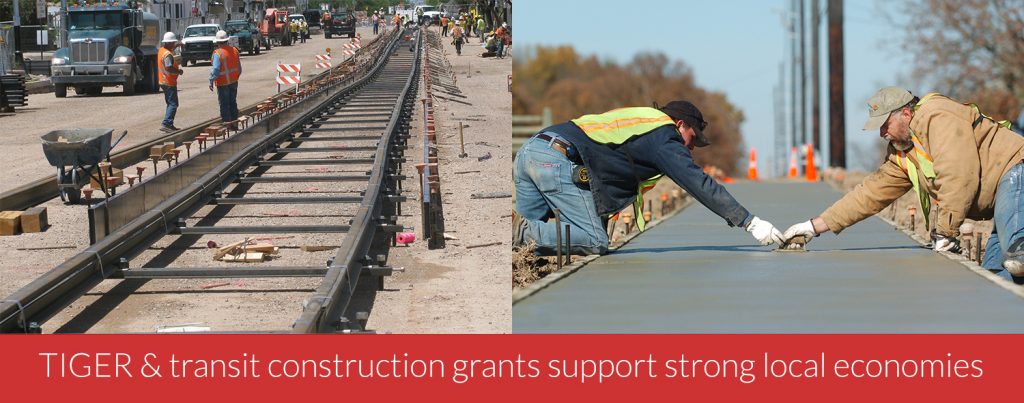
In a budget deal to fund the government through the end of September, Congress partially accommodated the President’s requests for more defense and security spending, but ignored his requests to eliminate funding for TIGER, new transit construction, and other programs vital for building strong local communities.

Congress agreed on a budget to fund the government through the rest of the current fiscal year, but they did so by increasing spending nearly across the board, avoiding any hard questions about what to cut to make room for the President’s desired defense increases (or tax cuts), performing some fiscal wizardry to keep the bill from scoring as if it won’t exceed the budget caps previously agreed to by Congress several years ago.
Though the President had urged Congress to make deep cuts to crucial transportation programs immediately this year, Congress responded to what they heard from state and local leaders of all stripes (and many of you!) and did not eliminate the competitive TIGER grant program or the funding that’s paired with local or state dollars to build or expand new public transit service.
“We applaud the appropriators in Congress for listening to the business leaders, local elected officials and advocates from across the country and protecting funding for these programs that are vital to the health and prosperity of their communities,” said T4America Interim Director Beth Osborne. “But we also know that this budget deal was underway before last November’s election and there will be real pressure in the coming months to make these same cuts when Congress considers the 2018 budget later this year.”
[member_content]T4America members, you can read our full summary of the 2017 appropriations bill, which includes the list of transit projects Congress recommends to FTA for funding this year.
USDOT 2017 Appropriations bill summary[/member_content]
Overall, transportation programs are mostly funded at levels consistent with what’s in the FAST Act, though Congress actually appropriated more ($2.4b) for transit capital construction than was proposed by the FAST Act for this year ($2.3b). They allocated the full $500 million for a ninth round of TIGER grants, though it’s unclear if USDOT will be able to move the process along fast enough to make grant awards this calendar year.
Despite the President’s previous request to completely halt the pipeline of transit construction projects immediately, the bill urges the Federal Transit Administration to keep it moving forward by writing checks for the transit projects that already have grant agreements, and — most importantly — to set aside funding this year for the scores of projects expected to sign grant agreements this year, like planned bus rapid transit projects in Albuquerque, Indianapolis, Everett (WA), and Kansas City, among many others.
This does not mean that the pipeline of transit projects is safe and back to normal — far from it. For the projects without signed grant agreements, they must still obtain them before any funds can be received, and there have been rumors that the Trump Administration would simply stop signing them — whether Congress allocates money for them or not.
Secondly, this budget only covers the rest of the year through September 30. President Trump’s blueprint for the 2018 budget is what made all the headlines a few weeks ago, in which he proposed zeroing out these vital programs. Congress largely avoided the tough questions by making Trump’s requested defense increases but not making other equivalent cuts to pair with them. How will Congress respond during negotiations on the 2018 budget?
We’ll call on you again to hold their feet to the fire then, but for now, we urge you to send all of your representatives a message of thanks for rallying on a bipartisan agreement to protect the transportation funding that local communities depend on.
Congress is expected to pass the bill before the current continuing budget resolution (CR) expires on Friday (May 5.)
[VIDEO] The future of federal passenger rail funding
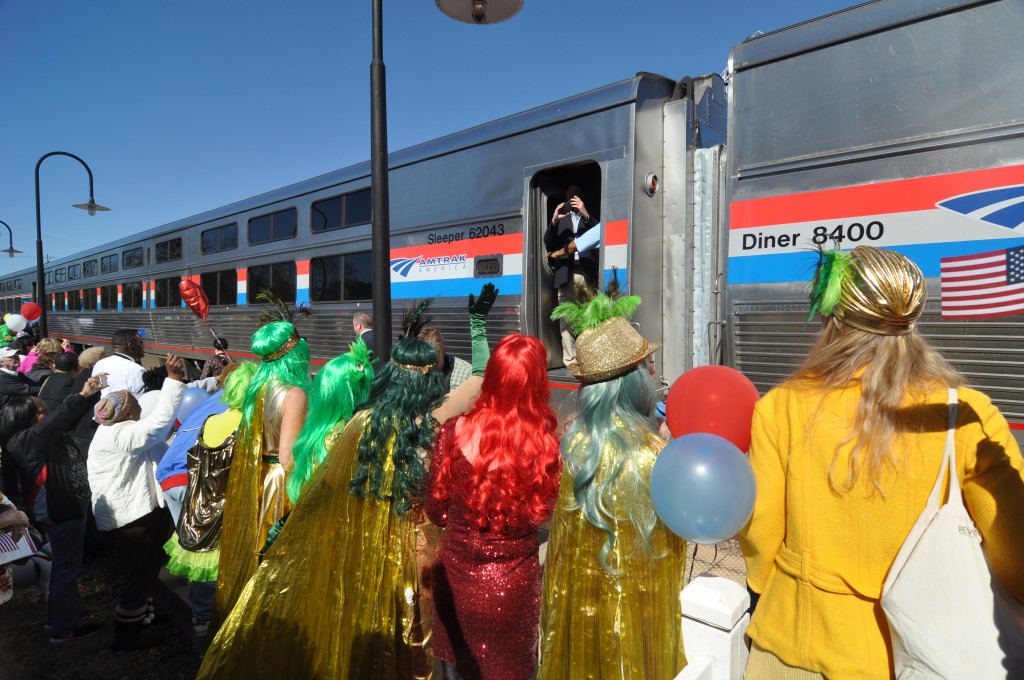
After months of talk about investing in infrastructure, one of President Trump’s first acts on infrastructure was to propose eliminating funding for several crucial transportation programs, including long-distance passenger rail. We convened a small panel of experts to explain about the impacts on passenger rail and what interested advocates and local leaders need to know.
Did you miss the session? You can catch up with the full discussion here:
When the current short-term appropriations bill runs out near the end of April 2017, Congress will be debating passenger rail funding levels for next year as well as the remainder of FY 2017. Here are few things that interested advocates should know and do:
FIND STATIONS IN YOUR AREA THAT WOULD BE AFFECTED
We’ve posted a detailed table online that lists all the stations that would be immediately affected by eliminating long-distance passenger rail service, crosswalked with House districts. Find the station(s) in your district and include that information in any letters or phone calls to your representatives.
GET UP TO SPEED ON THE ISSUE
Equip yourself with these short talking points on passenger rail and the threats posed to it in the federal budget.
CONTACT YOUR REPRESENTATIVES
Beyond just cuts to passenger rail, the Administration’s proposed budget falls short of prioritizing investment in the local communities that are the basic building block of the national economy, and we need you to help stand up and send that message loud and clear to Congress.
Take ActionWATCH OUR GULF COAST VIDEO
As mentioned on the webinar, we produced a short video about the amazing groundswell of bottom-up, grassroots support in cities and towns all along the Gulf Coast for restoring passenger rail service from Louisiana to Florida. Watch that and share it here.
Do our federal transportation priorities match the rhetoric we use to justify more spending?
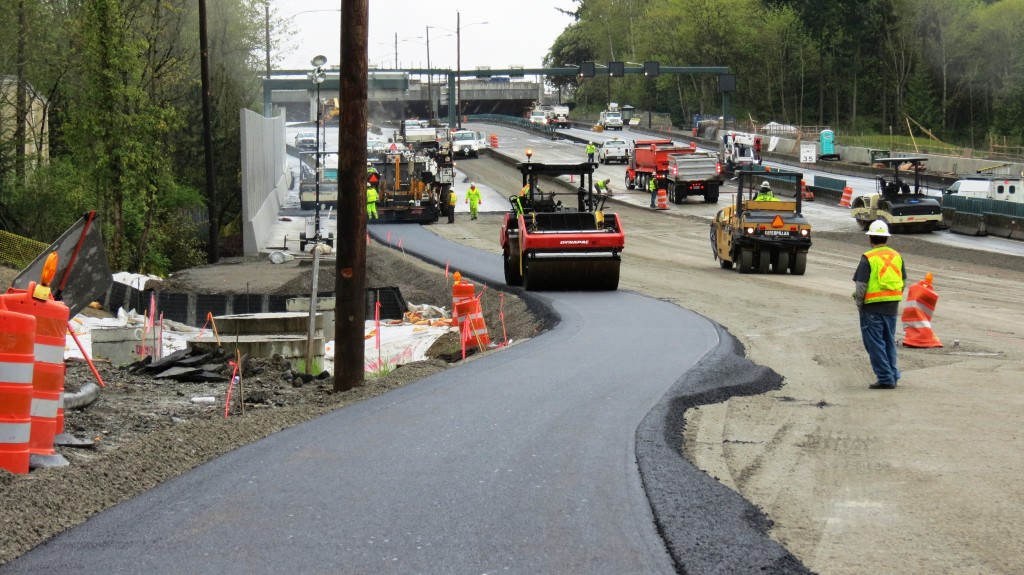
With the Trump administration readying both an annual budget and discussing a possible large infrastructure package, Transportation for America yesterday urged a key Senate subcommittee to protect the investments in programs that promote innovation, encourage collaboration and maximize benefits for local communities.
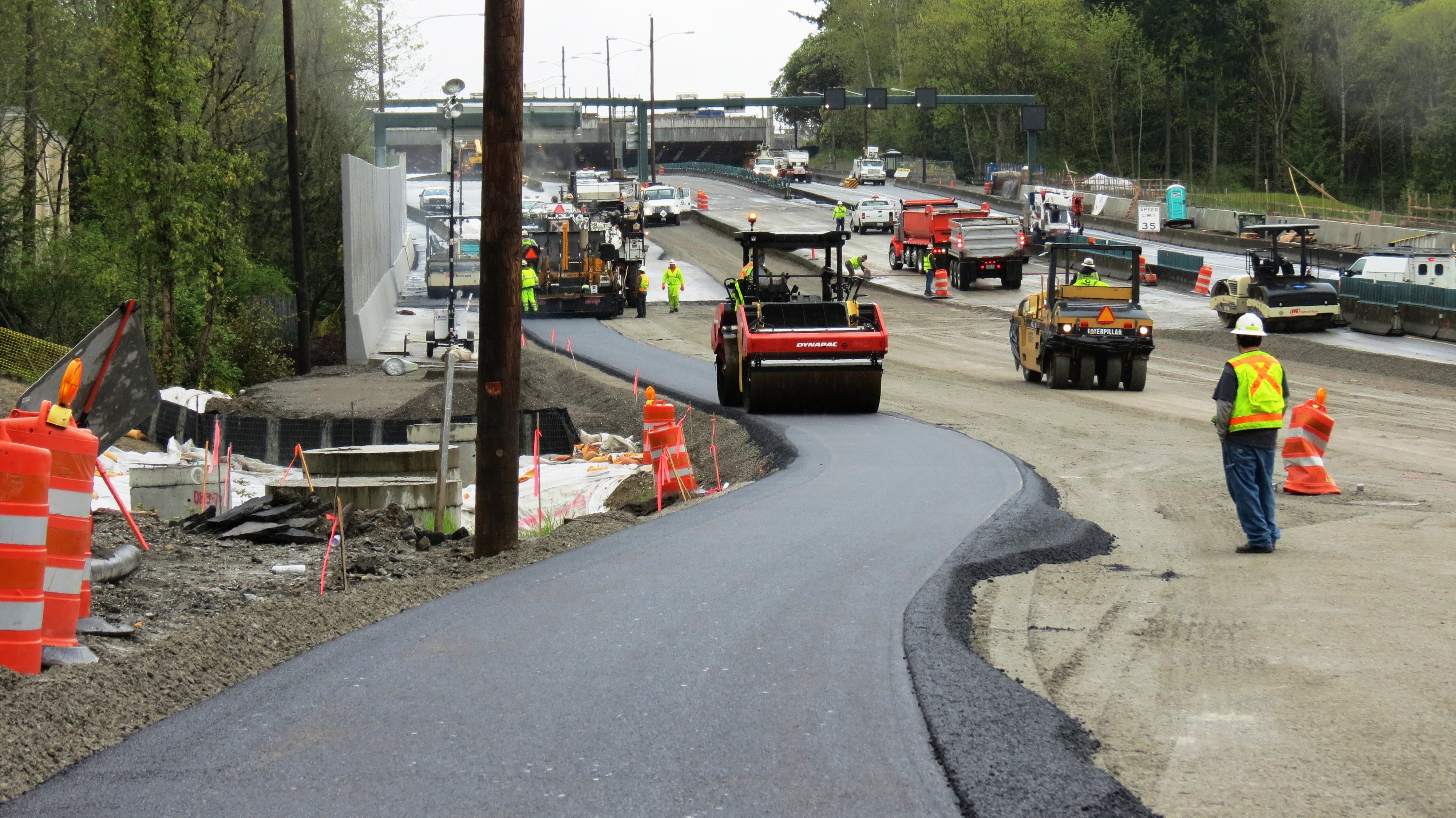
The President’s first budget will almost certainly propose big cuts to discretionary spending programs. While the bulk of annual federal transportation spending is sourced from the highway trust fund and should be more insulated from these cuts, discretionary cuts would fall disproportionately on funding for new transit construction (New and Small Starts) and multimodal and local priority projects (TIGER).
House and Senate appropriators will have two decisions to make: a) whether to appropriate the amounts prescribed by the current long-term transportation law (the FAST Act) for the core programs, which is uncertain as well, and, b) how much to allocate for these other discretionary transportation programs.
As expected, with the heads of a few national trade groups also testifying yesterday alongside T4America before the Senate Appropriations Subcommittee on Transportation, Housing and Urban Development, there was the usual rhetoric about America’s “crumbling” infrastructure amidst calls to invest more money overall in the federal transportation program.
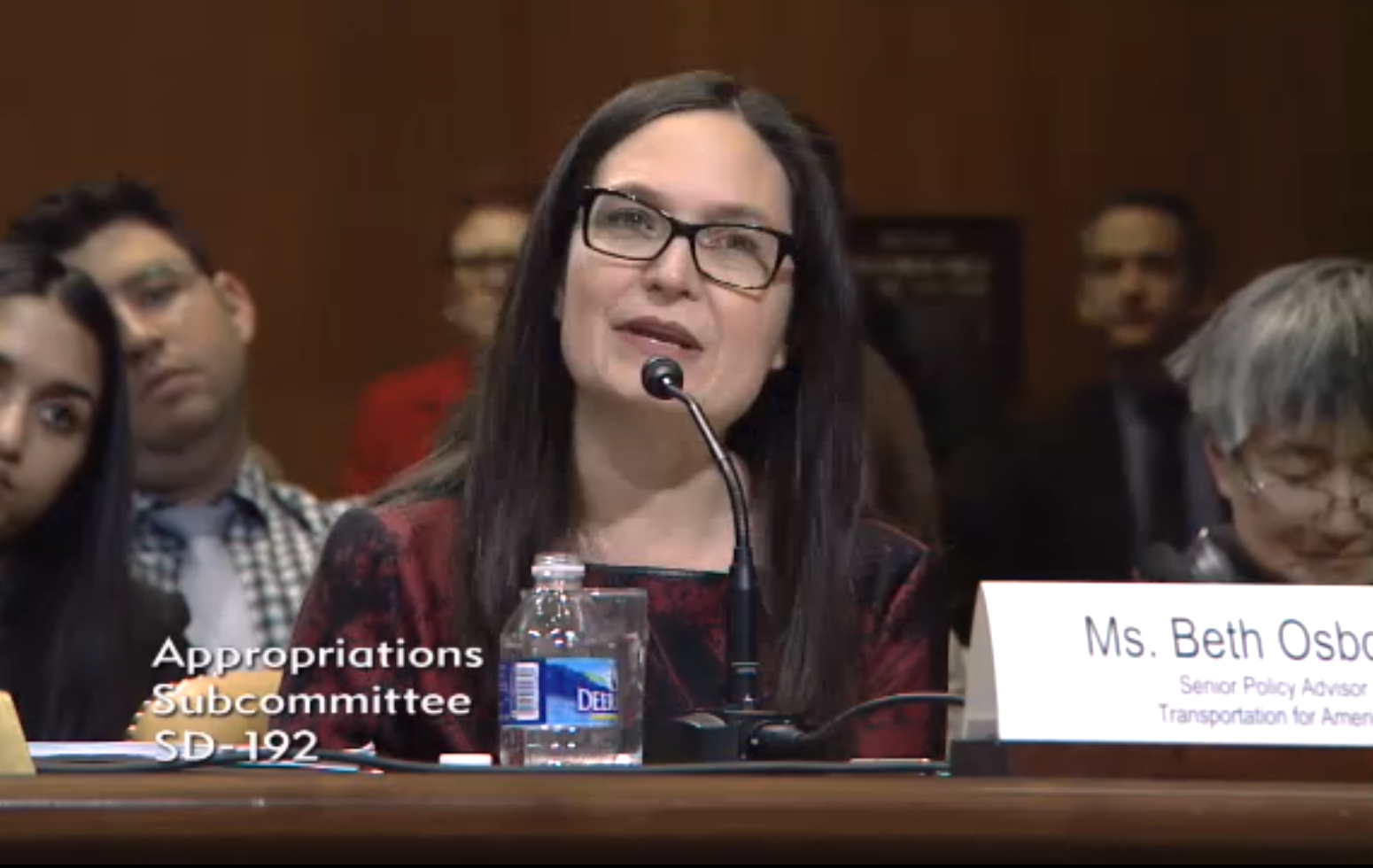
And while T4America agrees on the need for greater levels of overall investment, T4A senior policy advisor Beth Osborne (pictured above) differentiated our overall position.
“As everyone testifying today will say,” she noted in her opening remarks, “we have great need to invest in our transportation system, including our roads, bridges, and transit systems. However, Transportation for America also believes that our problems run far deeper than just an overall lack of funding.”
When we have these discussions about the need to invest in infrastructure — especially in Washington — all sorts of ominous numbers are thrown around. Tens of thousands of deficient bridges. Pavement condition that’s worsening by the day. Backlogs of neglected maintenance and repair.
But where does the money go once we increase transportation spending and dole it all out to the states? Beth Osborne explained:
In fact, while we talk about the need for more funding to address our crumbling infrastructure, that is not necessarily where the funding goes. A 2014 report conducted by Smart Growth America called “Repair Priorities” found that between 2009 and 2011 states collectively spent $20.4 billion annually to build new roadways and add lanes. During that same time, states spent just $16.5 billion annually repairing and preserving the existing system, even while roads across the country were deteriorating. As we talk about large infrastructure packages, it’s only fair to ask that the priorities of our transportation program more closely match the rhetoric we use to justify more spending on it.
Why do we keep spending hefty sums on new roads and new lanes while repair backlogs get ignored? One reason is that transportation and development decisions are rarely well coordinated and we end up trying to address bad land use decisions with more transportation spending, and vice versa.
More from Beth:
I think about the two houses in Florida that are 70 feet apart but require a seven-mile drive to get from one to the other. Such a roadway and land use pattern seems almost designed with the express purpose of generating traffic snarls. But the problem is not categorized as a development or local road connectivity problem. It is put to the state and the federal government as a congestion problem that requires big spending to widen roads. Now no one is calling for the federal government to get involved in local land use decisions. However, there should be a way to reward cities and states consider these and take action improve outcomes and lower costs. Competitive programs can help to do that.
One of those competitive programs is the TIGER grant program, which could be one of the programs targeted for severe cuts — or elimination — in this looming budget proposal from the President.
TIGER has awarded more than $4 billion since 2010 to smart local projects, bringing 3.5 local dollars to the table for every federal dollar through just the first five rounds. Though only 5-6 percent of all applicants have successfully won funding, local leaders still love the programs, and the process encouraged applicants to try new strategies or approaches to be as competitive as possible to win funding — “like design-build project delivery or complete street designs or public-private partnerships,” Beth noted.
Rather than just sidling up to the table for their share of dollars allocated by some federal formula, communities have been trying to produce the best, most competitive applications that will bring the highest returns on both the federal investment and their local commitment.
This is the kind of innovation that Congress should be encouraging, not targeting for cuts.
In the New and Small Starts transit capital programs, there’s over $6 billion already promised to shovel-ready transit projects all across the country that have already raised local or state funding and are just waiting on capital dollars from the federal government to proceed. Projects like Indianapolis’ Red Line bus rapid transit project that has already been promised more than $70 million in federal dollars to pair with nearly $20 million in local funds from an income tax increase that Indianapolis voters approved back in November at the ballot box.
Indianapolis and a multitude of other communities small and large “are stretching themselves to raise their own funds and to innovate, but they cannot bring these important projects to fruition without a strong federal funding partner,” Beth said in closing this morning. “The programs that this committee funds are often the lynchpin for aiding states and localities in meeting these demands.”
We hope that this Senate subcommittee heard the message loud and clear and will stand up for these vital programs as the budget process moves forward. We’ll keep you updated.
After years of trying to slash funding, the House proposes solid funding for next round of TIGER grants
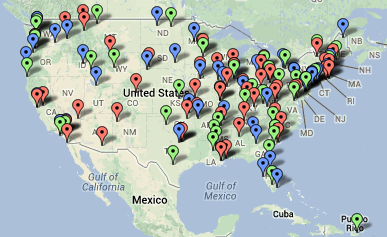
After several years of consistently trying to cut or outright eliminate the program’s funding entirely, House appropriators last week approved $450 million for competitive TIGER grants within the annual budget bill for all transportation and housing programs.
Perhaps the House got the message delivered back in March?
Over 170 elected officials and local, civic and business leaders from 45 U.S. states today sent a letter to congressional appropriators urging them to provide at least $500 million for another round of TIGER competitive transportation grants as well as the full amount authorized in last year’s FAST Act for new transit construction. As Congress begins to craft the transportation budget for the 2017 fiscal year, the 170-plus local leaders of all stripes, representing an incredible diversity of places, sent a powerful message that opportunities provided by TIGER and FTA’s New Starts program are crucial to their long-term success.
While they fell short of the mark set in this year’s Senate spending bill of $525 million, the House seems to be coming around on TIGER, which is terrific news.
Overall, the House Transportation, Housing and Urban Development (THUD) bill would provide $19.2 billion for the discretionary programs that include TIGER grants, New Starts transit construction and Amtrak, which on the whole, represents an increase of $540 million compared to the current year. Though it would provide $75 million less than the Senate’s funding level for TIGER grants, at $450 million, it represents a big change from just three years ago when the proposed House THUD bill contained zero funding for TIGER. And at least once, the House tried to restrict TIGER funding only to highway projects, leaving the huge number of smart multimodal projects that normally apply out in the cold.
The New Starts transit construction program would receive a significant boost at $2.5 billion total, which is $160 million more than what’s called for by the FAST Act and $320 million more than last year.
What’s the TIGER program?
The fiercely competitive TIGER program is one of the few ways that local communities of almost any size can directly receive federal dollars for their priority transportation projects, and represents one of the most fiscally responsible transportation programs administered by USDOT.
Unlike the overwhelming majority of all federal transportation dollars that are awarded via formulas to ensure that all states or metro areas get a share, regardless of how they’re going to spend those dollars, the federal government has found a smart way to use a small amount of money to incentivize the best projects possible through TIGER. Projects vying for funding compete against each other on their merits to ensure that each dollar is spent in the most effective way possible. It’s a roadmap to a more efficient way to spend transportation dollars that spurs innovation, stretches federal transportation dollars further than in conventional formula programs, and awards funding to projects that provide a high-return on investment.
Why isn’t the funding guaranteed by the FAST Act?
TIGER, in addition to Amtrak funding and the program used for almost all new transit expansion, are not guaranteed funding each year from the highway trust fund. Unlike federal highway and transit formula programs, these programs have to go before appropriators in Congress each year who decide how much to give each program, resulting in this same debate nearly every year. (An attempt to provide dedicated annual funding for TIGER in the FAST Act failed during negotiations over that bill.)
While this House budget is indeed good news, just like the Senate’s version passed several weeks ago, it could face a shaky path forward. President Obama issued a veto threat to the Senate bill due to the potential for “problematic ideological provisions” included in the bill, including a Senate provision to relax hours-of-service rules for truckers that the House also includes similar language on.
Though it’s unlikely that the House and Senate will complete this budget bill before the October 1 deadline, as in past years, the content of the House and Senate transportation funding bills are incredibly important. They form the starting point for the debate and will likely be consolidated at some point early in the upcoming fiscal year.
Read more about a policy provision also included in this House budget, which instructs USDOT to begin measuring how transportation investments will connect all Americans to opportunity and essential daily needs such as jobs, schools, healthcare, food and others.



